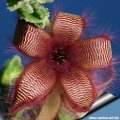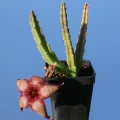Donate now to support the LLIFLE projects.
Your support is critical to our success.
Your support is critical to our success.
Accepted Scientific Name: Stapelia hirsuta L. L.
Sp. Pl. 1: 217 (1753) L.
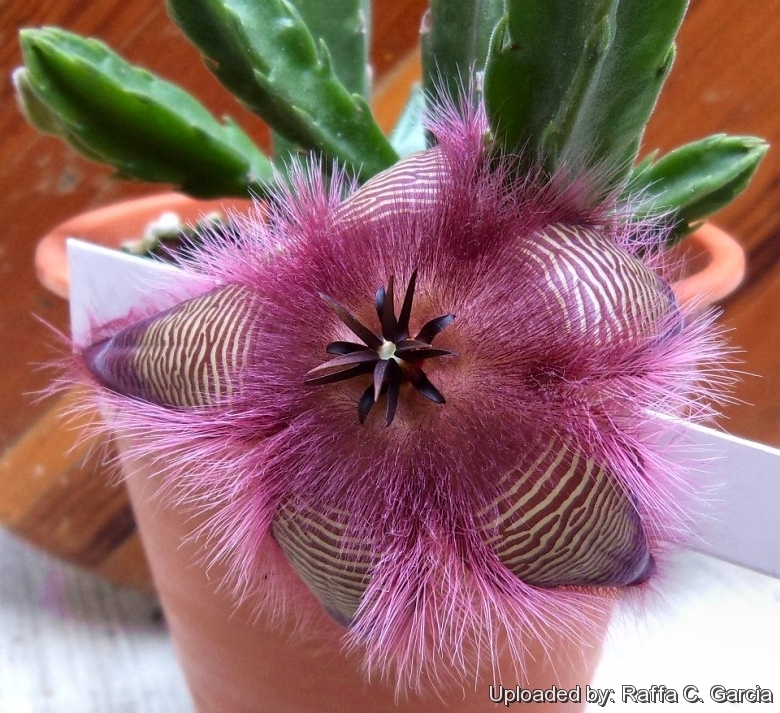
Gonostemon hirsutus (Stapelia hirsuta L.) Photo by: Raffa C. Garcia
The dark-red flowers smell like a carrion and are covered by long setae that remember the fur of a dead animal , this way they attract flies for pollination (sapromyophily). The flowers are densely shaggy (hirsute) at the centre. Purplish colour simulate the rotting flesh of dead animals. These flowers attract beetles and carrion flies who pollinate the plant as they are fooled into trying to lay eggs on the flower.
The dark-red flowers smell like a carrion and are covered by long setae that remember the fur of a dead animal , this way they attract flies for pollination (sapromyophily). The flowers are densely shaggy (hirsute) at the centre. Purplish colour simulate the rotting flesh of dead animals. These flowers attract beetles and carrion flies who pollinate the plant as they are fooled into trying to lay eggs on the flower.
Synonyms:
- Stapelia hirsuta L. L.
- Gonostemon hirsutus (L.) P.V.Heath
- Stisseria hirsuta (L.) Kuntze
See all synonyms of Stapelia hirsuta L.
back
Accepted name in llifle Database:Stapelia hirsuta L. L.
Sp. Pl. 1: 217 (1753)
Synonymy: 51
- Stapelia hirsuta L. L.
- Gonostemon hirsutus (L.) P.V.Heath
- Stisseria hirsuta (L.) Kuntze
- Stapelia asterias Masson
- Gonostemon asterias (Masson) P.V.Heath
- Stapelia asterias var. gibba N.E.Br.
- Gonostemon asterias var. gibbus (N.E.Br.) P.V.Heath
- Stapelia asterias var. lucida (DC.) N.E.Br.
- Gonostemon asterias var. lucidus (DC.) P.V.Heath
- Stapelia lucida DC.
- Stapelia elongata Sweet
- Stapelia hamata Jacq.
- Stisseria hamata (Jacq.) Kuntze
- Stapelia hirsuta var. affinis (N.E.Br.) N.E.Br.
- Gonostemon hirsutus var. affinis (N.E.Br.) P.V.Heath
- Stapelia affinis N.E.Br.
- Stapelia hirsuta var. atra Lindl.
- Stapelia hirsuta var. comata (Jacq.) N.E.Br.
- Gonostemon hirsutus var. comatus (Jacq.) P.V.Heath
- Stapelia comata Jacq.
- Stisseria comata (Jacq.) Kuntze
- Stapelia hirsuta var. depressa (Jacq.) N.E.Br.
- Gonostemon hirsutus var. depressus (Jacq.) P.V.Heath
- Stapelia depressa Jacq.
- Stapelia hirsuta subvar. depressa (Jacq.) A.Berger
- Tridentea depressa Schult. ex Don
- Stapelia hirsuta var. grata N.E.Br.
- Gonostemon hirsutus var. gratus (N.E.Br.) P.V.Heath
- Stapelia hirsuta var. longirostris N.E.Br.
- Gonostemon hirsutus var. longirostris (N.E.Br.) P.V.Heath
- Stapelia hirsuta subvar. longirostris (N.E.Br.) A.Berger
- Stapelia patula var. longirostris N.E.Br.
- Stapelia hirsuta var. lutea N.E.Br.
- Gonostemon hirsutus var. luteus (N.E.Br.) P.V.Heath
- Stapelia hirsuta var. patula (Willd.) N.E.Br.
- Stapelia patula Willd.
- Stisseria patula (Willd.) Kuntze
- Stapelia hirsuta var. unguipetala (N.E.Br.) N.E.Br.
- Stapelia unguipetala N.E.Br.
- Stapelia lanifera Haw.
- Stapelia lanigera Loudon
- Stapelia margarita B.Sloane
- Stapelia pulvinata f. margarita (B.Sloane) G.D.Rowley
- Stapelia patentirostris N.E.Br.
- Stapelia pulvinata Masson
- Gonostemon pulvinatus (Masson) P.V.Heath
- Stapelia sororia Masson
- Gonostemon grandiflorus var. sororius (Masson) P.V.Heath
- Stapelia stellaris Haw.
- Stapelia villosa N.E.Br.
- Stapelia villosa var. N.E.Br. N.E.Br.
back
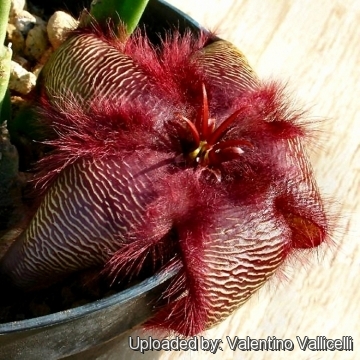
Gonostemon hirsutus (Stapelia hirsuta L.) Photo by: Valentino Vallicelli
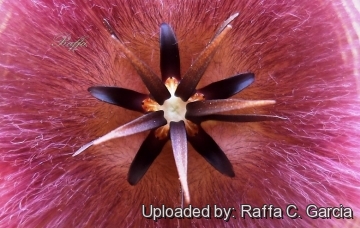
Gonostemon hirsutus (Stapelia hirsuta L.) Photo by: Raffa C. Garcia
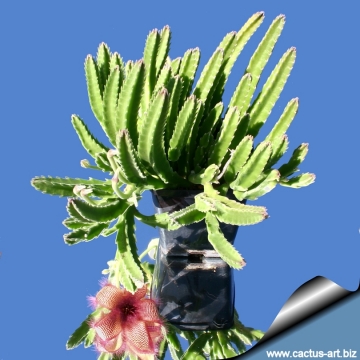
Gonostemon hirsutus (Stapelia hirsuta L.) Photo by: Cactus Art
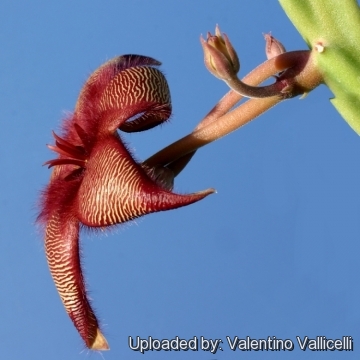
Gonostemon hirsutus (Stapelia hirsuta L.) Photo by: Valentino Vallicelli
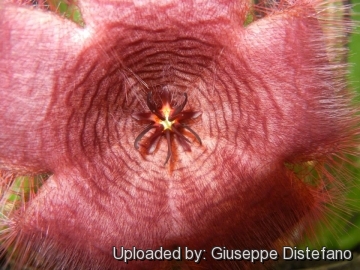
Gonostemon hirsutus (Stapelia hirsuta L.) Photo by: Giuseppe Distefano
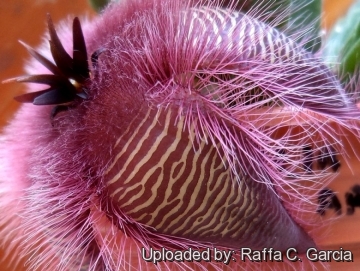
Gonostemon hirsutus (Stapelia hirsuta L.) Photo by: Raffa C. Garcia
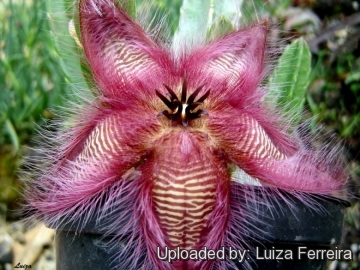
Gonostemon hirsutus (Stapelia hirsuta L.) Photo by: Luiza Ferreira
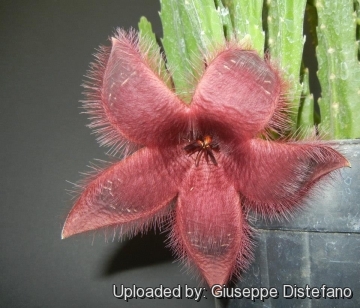
Gonostemon hirsutus (Stapelia hirsuta L.) Photo by: Giuseppe Distefano
| Your Actions | |
|---|---|
| Back to Gonostemon index | |
| Back to Asclepiadaceae index | |
 |
Back to Succulents Encyclopedia index |









